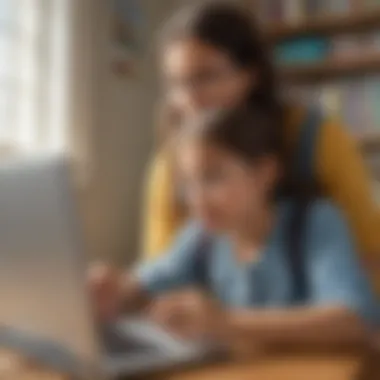Discover Free Online Reading Resources for 4th Graders


Intro
Reading is a vital skill for 4th graders as they begin to encounter more complex texts. Parents and educators look for resources that can enrich their child's reading experience while fostering a love for literacy. The internet offers a treasure trove of free online reading materials tailored for young learners. Such platforms not only help in improving their reading skills but also make learning enjoyable. This article dives into various free online reading resources that 4th graders can utilize, including creative activities, quizzes, and informative articles. The objective is to provide practical insights for fostering literacy among school children in an engaging manner.
Creative Activities
Crafting parallel to reading can enhance a child’s understanding and appreciation of stories. Creative activities serve as an extension of reading, allowing children to express their thoughts through art.
Craft Ideas
Engaging children in crafts related to their reading material is an effective way to deepen their connection. For example, children can create dioramas of a scene from a favorite book or construct characters from stories using recycled materials. This hands-on approach anchors literary concepts through tactile experience.
Step-by-Step Guides
Detailed instructions are invaluable when presenting craft activities. Start with selecting a theme based on a book they recently read. Involve them in brainstorming ideas:
- Choose colors and shapes of materials needed.
- Gather all materials, ensuring the workspace is prepared.
- Walk through each step, allowing space for them to interpret the instructions and express creativity.
Educational efforts become more fruitful when used with hands-on activities that marry literature with creativity.
Educational Value
Participating in craft endeavors can reinforce comprehension and encourage critical thinking. Children reflect on characters and narratives, leading to a deeper understanding. Craft-making negotiations literature bring vocabulary themes to a child's learning environment closer, enhancing their overall grasp of reading materials.
Fun Quizzes
Quizzes can be a valuable tool for reinforcing what children read. They can serve as both assessments and fun activities to engage young minds.
Quiz Topics
ElemFun, an excellent platform, provides quizzes on popular topics such as:
- Fiction vs. Non-Fiction
- Theme and Main Idea
- Character Traits
Question Types
The diversity of question types used holds great importance. Children may encounter multiple-choice questions, true or false, and open-ended formats. This variety maintains attention and boosts engagement, catering to different learning styles.
Knowledge Reinforcement
Quizzes reinforce knowledge by challenging what children have learned. Oftentimes, they will encounter their favorite characters or stories presented in questions, configuring trivia around familiar content. This fosters retention through interactive learning.
Fact-Based Articles
Reading comprehensively requires exposure to numerous formats of writing. Fact-based articles enhance knowledge and provide insight into a range of topics aligning well with children's interests.
Topics
Diverse subjects cover categories like:
- Science Explainers
- Historical Figures
- Weather Phenomema
Engaging Content
Fact articles are crafted to connect with students using relatable language in simple formats that promote curiosity. Centering engaging topics holds children’s interest, averting reading fatigue. Rich informational themes provide insights right through accessible materials.


Foreword to Online Reading for 4th Graders
Reading is crucial for children at a young age. By 4th grade, kids are transitioning from learning to read to reading to learn. This means their ability to comprehend text influences their academic journey significantly. Online reading resources expand access to diverse reading materials, fostering a culture of literacy that lasts into adulthood.
Importance of Reading at this Age
At the age of 9 or 10, children's reading skills start to evolve. Books encourage imagination, critical thinking, and analytical skills. Furthermore, speaking, listening, and collaboration stem from shared readings. Reading at this stage aids children in grasping vocabulary richness and appreciating contextual situations.
Some benefits of reading at this age include:
- Enhancing vocabulary: Children meet many new words and ideas. This experience builds language proficiency.
- Forming connections: When children relate to characters or stories, they develop emotional intelligence.
- Boosting comprehension skills: Engaging with various texts helps kids learn to summarize and draw conclusions.
Online resources enhance these benefits, offering a brighter range of materials when compared to traditional methods.
The Role of Free Resources in Learning
Access to free online reading resources lowers barriers for learners. Not every family has the means to purchase books. Online platforms bridge that gap, allowing every child to enjoy fiction, non-fiction, and poetry. Affordable and, sometimes free, these resources contain educational value just as robust as the printed page.
Free reading resources serve multi purposes, such as:
- Diversity of content: Children can explore numerous genres, enticing different learners.
- Variety in accessibility: This flexibility promotes independent reading and individualized pace.
- Parental involvement: Some platforms include guidance for parents. This support can help households maintain and encourage consistent reading habits.
Understanding the Needs of 4th Grade Readers
Understanding the needs of 4th grade readers is crucial in today’s educational landscape. This age marks a significant transition in literacy, with students moving from learning to read to reading to learn. It is at this point that comprehension skills develop further. Targeted resources can ignite a child’s interest in reading, bolster confidence, and nurture improved skills.
Reading Comprehension Skills
Reading comprehension is a vital skill for 4th graders. At this level, children should understand not just the words on the page, but also the meaning behind them. Activities focused on comprehension can involve asking questions about a text, summarizing main ideas, and analyzing characters and plots. These skills enhance critical thinking, allowing children to relate what they read to their own experiences or other literature.
When children engage with appropriate reading materials, they develop better comprehension abilities. Resources such as digital books often come equipped with interactive features to help facilitate understanding. There are many platforms available to support reading practice tailored to a range of skills, promoting the idea that reading comprehension grows with engagement and practice.
Diverse Interests and Genres
Fourth graders exhibit diverse interests, which makes it essential for reading resources to reflect this variety. By offering different genres—like fiction, non-fiction, fantasy, and poetry—children can explore topics that resonate with them. This exploration not only makes reading enjoyable but can also foster a lifelong love for literature.
Educators and parents should encourage children to find what sparks their interest. Exposure to different genres broadens children’s horizons and improves literacy levels. Access to various materials can take the form of online platforms, which curate texts aligning with children’s preferences while simultaneously providing educational content. Examples of platforms that cater to different interests can be found on educational websites, which often feature diverse literature exempt from cost.
Offering access to diverse genres is a key component in aiding 4th graders’ emotional and educational growth through literature.
Tailoring reading experiences based on interests ensures that children remain engaged and eager to dive into their next book. As they relate to characters and themes, their vocabulary and understanding of narratives will flourish organically.
Platforms Offering Free Online Reading Books
Access to free online reading books has become increasingly vital for 4th graders. These platforms provide not only various textual experiences but also a way to foster a love for reading. Emphasizing free resources ensures that every child, regardless of their economic background, can explore literature. Furthermore, many educational systems support digital reading integration, especially in light of the shift towards online learning during the pandemic. Each resource provides unique content that contributes to developing literacy skills and critical thinking in young readers.
Public Domain Books and Resources
Public domain books are essential for free online reading. They encompass texts that no longer hold copyrights, allowing them to be freely accessed and distributed. Websites hosting public domain works provide a treasure trove of classic literature and diverse genres. Examples of these platforms include:
- Project Gutenberg: This vast library offers over 60,000 free eBooks. Children can find age-appropriate texts among varied genres. Classic novels can often spark interest in creative storytelling and character development.
- Bartleby: A site hosting an assortment of classic literature, essays, and poetry suitable for 4th graders who are ready to tackle more complex themes.
- Internet Archive: It provides access to millions of free books, audio, and video resources that enrich the reading experience.
Engaging with public domain books enables students not just to read any book. They learn about history, cultures, and critical narratives that shape the world around them. Quality reading material helps form connections to their studies.
Educational Websites with Free Access
Several educational websites understand the need to cultivate a love for reading. They provide materials for free cameos with interactive tools that promote skills development. Notable mentions include:


- Epic!: Particularly aimed at children, Epic! provides a vast library of books, audiobooks, and videos tailored to different interests. Their free access is available specifically to educators.
- ReadWorks: Offers a collection of reading comprehension lessons that include full texts, helping reinforce understanding and engagement with materials chosen by teachers.
- PBS Kids: Besides offering books, PBS Kids complements their reading resources with videos and games featuring their popular characters. This resonates well with younger readers, encouraging them to explore stories tied to media they enjoy.
These websites often use gamification and other engaging elements to capture children's interest effectively. Through these tools, children can practice skills and engage with content that complements their classroom learning.
Library E-Book Programs
Library e-book programs are a fantastic way to access a broader range of materials while enjoying the advantages of a local library. Many libraries offer e-book solutions allowing patrons to borrow books online. Key facts include:
- OverDrive and Libby apps provide library clients with the convenience of borrowing e-books from home. Both apps feature substantial collections that align with school curricula.
- Hoopla also enables immediate online access to audiobooks, comics, and movies alongside books, creating an all-in-one solution for youth entertainment and education.
Participation is simple; users must only have a library card for access. This initiative reinforces local libraries' role in fostering literacy and lifelong learning. By taking advantage of such offerings, students enhance their reading habits and knowledge base with updated resources.
Popular Free Online Reading Resources
In analyzing the landscape of free online reading materials for 4th graders, it is clear that various platforms offer substantial value. These resources are accessible and diverse, providing children with opportunities to discover literature that resonates with them. Utilizing these tools can not only build reading skills but can also instill a habit of lifelong learning. When equipped with the right resources, children are more likely to explore various genres and expand their comprehension abilities.
Project Gutenberg
Project Gutenberg stands as a hallmark of free digital literature. With its repository of over 60,000 eBooks, it offers a wide range of classic literature. Many of these texts are available in various formats, such as plain text, PDF, and ePub, leading to versatility in reading choices. This assortment allows children to immerse themselves in stories that have shaped literature throughout history.
Additionally, Project Gutenberg emphasizes user-friendliness. Its simple interface allows even the youngest reader to navigate easily and find their preferred books. Familiarizing children with classic stories can foster an appreciation for literature, while exposing them to rich themes and vocabulary.
Open Library
Open Library operates under an ambitious goal: to catalog every book ever published. For young readers, this resource features a wide array of books ranging from contemporary fiction to timeless classics. It operates with a 'borrow' model akin to a traditional library, sometimes requiring a free account for certain titles. This element introduces children to the concept of sharing and borrowing, key principles of literacy per se.
Notably, Open Library provides educational tools such as links to summaries and discussion questions for popular books. This embracing of annotation can aid kids in their critical thinking regarding texts, a vital reading ingredient. Furthermore, the community-driven nature of this platform spins and shares recommendations, fostering interaction and engagement.
Epic! Free for Educators
Epic! is an extraordinary online reading platform designed mainly for educators, offering free access to a varied library of resources specifically tailored to children. This platform boasts an extensive collection of books and audiobooks across different areas—including non-fiction, chapter books, and read-aloud options suitable for 4th graders.
With features that make reading interactive, such as personalized reading lists and quizzes, Epic! cultivates an engaging environment for young learners. The requirement for teachers to create accounts ensures safe navigation for kids while enabling tracking of reading activity. Importantly, Epic! embraces both emerging and struggling readers by providing varying levels of reading engagement.
Providing access to various reading resources is crucial in encouraging literacy at a young age. Having a diverse selection at their fingertips allows children to experience reading in multifaceted ways.
Selecting from Project Gutenberg, Open Library, and Epic! allows children an enriched reading experience. Overall, with appropriate usage of these resources, young readers can cultivate their literary interests organically.
Guiding Children in Their Reading Journey
Guiding children in their reading journey is a crucial aspect of fostering a lifelong love for literature. As 4th graders develop their reading abilities, they begin to explore deeper concepts and various genres. It becomes essential to provide them with structured support. This guide outlines strategies to help children navigate free online reading resources effectively.
Setting Reading Goals
Reading goals serve as motivating milestones for children. When children set specific targets, they are more likely to stay focused and committed to their reading. It is beneficial for parents and teachers to help students create achievable and measurable goals. Here are some practical steps for setting effective reading goals:
- Define clear objectives: Whether it’s finishing a certain number of books in a month or exploring new genres, clarity is the first step.
- Use a reading log: Keeping track of the books read provides both a visual cue for progress and a sense of accomplishment.
- Celebrate milestones: Recognizing when a child achieves their goal reinforces their commitment to reading.
- Encourage self-reflection: After finishing a book, discussing what they liked or learned helps deepen their understanding and appreciation of stories.
Setting positive reading goals not only boosts literacy but also enhances a child’s confidence and engagement. Learning to read independently is a pivotal life skill, and guiding them properly through goal-setting is an essential function of adult support.
Engaging Discussions about Books
Engaging in meaningful discussions about books can greatly enhance a child's reading experience. This practice helps students to articulate their thoughts and connect with the material on a deeper level. Conversations about reading can take various forms:
- Share personal experiences: Encourage children to relate the book's themes to their own lives. This connection builds empathy and understanding.
- Ask open-ended questions: Questions like “What did you think about the main character's decision?” provide space for children to think critically.
- Create a book club: Involving peers in discussions creates a shared reading experience and enhances social interaction.


Benefits of Online Reading for Young Learners
Online reading holds tremendous value for young learners, especially those in 4th grade. This phase in a child's educational journey can be pivotal. It's when they begin developing their reading skills more autonomously and explore different types of content. Access to free online reading resources can enhance their experience, making reading enjoyable and educational. In this section, we will look into two significant benefits of online reading resources: access to diverse materials and encouragement of independent reading.
Access to a Wide Range of Material
Children today have unique interests that may not always align with the traditional curriculum. With free online resources, kids have the freedom to choose what they want to read without constraint. They can access genres ranging from fantasy and adventure to science fiction and non-fiction.
This exposure helps develop critical thinking skills. When a child encounters various viewpoints through their reading, they learn to synthesize information from multiple sources, ultimately becoming better thinkers. Also, navigating diverse reading materials fosters a sense of ownership in their learning, which can lead to greater retention of information.
Remember that each child has their own tastes. Some kids may gravitate towards graphic novels like the Dog Man series or who-dun-it mysteries, while others might prefer Harry Potter. Wide access ensures that every child can find something captiviting.
Encouraging Independent Reading
The importance of fostering independent reading habits cannot be understated. Online resources allow children to grow more confident in their abilities. They can select their reading pace without competition and the pressure that can sometimes arise in the classroom environment.
When children read independently, they sharpen their comprehension skills. They learn to analyze text and think critically about content. Generally, their level of preference for certain subjects starts to develop. Coping with new vocabulary and questioning properties of the literature also enrich their learning experience.
Here are a few methods parents and caregivers can use to support independent reading:
- Establish a reading routine.
- Provide quiet, designated reading time in the day.
- Make suggestions of interesting books based quizzes their reading records online.
The goal is to optimize the child's interaction with materials freely available online. Combining access to a plethora of texts with the encouragement of independent choices creates a well-rounded atmosphere for learning. Balancing the two is crucial for nurturing a lifelong love of reading among our young learners.
Accessing varied materials while practicing independent reading at home can lead to excellent literacy outcomes.
Challenges and Considerations
Understanding the challenges and considerations related to online reading resources is critical for ensuring they are used effectively, particularly for 4th graders. While these resources present vast opportunities for young learners, there are important aspects to consider that impact their reading experience. Addressing these elements can help guardians and educators enhance the benefits of online reading materials while minimizing potential drawbacks.
Screen Time Management
With the internet readily accessible in many homes, children can easily exceed recommended screen time. This raises concerns about health and development. Screen time can disrupt sleep patterns, impact attention spans, and cause eye strain. Thus, it is crucial for parents and educators to establish clear guidelines regarding the duration and appropriateness of screen use for online reading.
- Set Limits: Establish time boundaries for reading yet promote routine.
- Encourage Breaks: Ensure children take breaks during long reading sessions to rest their eyes and mind.
- Variety of Activities: Integrating physical activities helps reduce screen saturation. All these considerations ensure reading remains productive and safe.
Maintaining Engagement with Content
Keeping the attention of 4th graders can be challenging. Online platforms must offer engaging content to maintain student interest. If readings are not engaging, students may quickly lose motivation.
- Interactive Elements: Many platforms now integrate videos, quizzes, and discussions. This cohesive approach helps in holding children’s interest.
- Choose Relevant Material: Tailoring reading selections to reflect students' interests directly impacts engagement.
- Parental Involvement: Active engagement from caregivers can excellently boost motivation. Ask thought-provoking questions or explore subjects together to foster an engaging reading environment.
Proper management of screen time and content engagement not only nurtures effective reading practices but also contributes to a positive association with literacy.
In summary, acknowledging the challenges and considerations surrounding online reading is essential in maximizing effectiveness. Ensuring proper screen time management will aid in defining a healthy routine. Likewise, maintaining engagement with relevant books and interactive methods can enhance the overall reading experience for 4th graders.
The End and Final Thoughts
This article emphasizes how vital free online resources are for 4th graders. These days, access to literature is more important than ever. Online resources are valuable for enriching reading experiences and developing essential literacy skills at a crucial age. When used wisely, they can significantly uplift the educational landscape for young learners.
Summarizing the Importance of Free Resources
Access to free online reading resources plays a crucial role in every child’s education. These platforms provide a wealth of knowledge and diverse materials. Here are the major points highlighting their significance:
- Equal Opportunity: Not every family may afford to buy books. Free resources ensure that all children have the chance to read and learn.
- Diverse Choices: Varied genres mean that children can explore their interests. This leads to better engagement in reading activities.
- Enhanced Literacy Skills: Reading widely provides opportunities for practicing comprehension, vocabulary, and critical thinking.
Encouragement for Parents and Educators
Parents and educators are pivotal in guiding children towards useful resources. Here are some key strategies for them:
- Be Informed: Stay updated on student-friendly platforms that offer diverse books. Websites like Project Gutenberg and Open Library are excellent starting points.
- Discuss Reading Choices: Talk to children about their reading preferences. This practice promotes deeper connections with literature.
- Create a Reading Routine: Encourage a consistent reading schedule from the available resources. A structured time for reading cultivates a lifelong habit.
Encouraging young readers to use free online resources can lead to a love for reading that lasts a lifetime. With proper guidance, children will not only enjoy reading but also build valuable skills to succeed acadamically.







